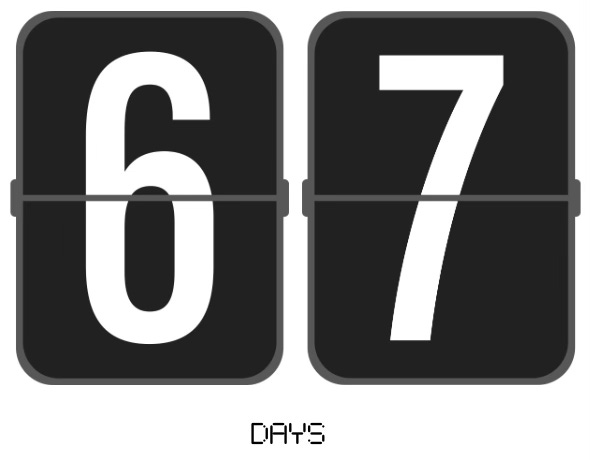Two related admissions to get out of the way now: I’ve been slacking on this newsletter, and I don’t want to tell you about a job I took. Yes, these items are related. They are tied up in a whole ball of “what am I doing with my life, exactly?” that I’m just not ready to address publicly. I’m not saying I’ll never address it, just…not today.
Instead, today I’m going to (hopefully) entertain you by dissecting a situation where two of my niche interests are having an unexpected culture clash. Basically, the CBC and Romance authors/readers are fighting, and it’s kind of like watching two of the less popular kids in school turn on each other.

Today’s Countdown Clock
It’s December 5th, 2024. Here’s the clock hanging over my head:
Click here for more about the countdown.
The Article in Question
To start, here is the source of all the angst:
I’ve hyperlinked the image itself, but I’m copying the link out below, because the slug at the end gives a clue as to why Romancelandia (a blanket term for people who talk about Romance books on the internet) is grumpy: https://www.cbc.ca/news/canada/spicy-books-smut-fiction
What’s the Problem Exactly?
This article isn’t holistically terrible. It’s not particularly ground-breaking either, but it is at its core a pop culture piece covering an element of pop culture. I bet it’s performing well in terms of views.
So what’s the problem, then? Well…technically, there are several. I’ve done my best to organize the big ones in escalating order of importance:
The references in this article are outdated. This is always the double-edged sword of writing about pop culture or current events, is it not? Still, the specific titles, trends, and spaces this article mentions feel very much like last year’s conversation. Icebreaker by Hannah Grace? A huge book on TikTok…that broke out in 2023. Hockey romance as a trend? Kinda peaked. The market is saturated, and lots of folks feel weird about the inherent whiteness of this particular sub-genre of a sub-genre. Fifty Shades of Grey by E.L. James? Honestly, if you’re still mentioning this book in the romance community, everyone just assumes you’re doing a historical study. It was an undeniably important moment for the genre, but that moment is nearly old enough to drive.
Romance on the whole is a progressive space. Yes, there are folks from all walks of political life in the fandom. (“Inspirational Romance” is an entire category defined by including God in the love story.) But for the most part, the modern genre started out as being for women, by women, at a time when such things were (even more) controversial than they are today. Communities built by people who feel oppressed often expand to include additional marginalized identities over time, and modern romance is vocally inclusive of: racial and ethnic diversity, all gender identities and sexual orientations, people living with disabilities, people with chronic illness, people in larger bodies, and people with all manner of interests and proclivities. Having that level of effort at inclusion and representation laughed off as “smut” tends to get people real, real mad.
They couldn’t have timed this worse in regards to the US election. This I can actually give a bit of a pass to. People in Canada pay a tremendous amount of attention to US politics, and most (all?) of my Canadian friends are as dismayed by our election results as I am. But even with their far superior awareness of our political system — seriously, I will send a prize to any American friend who can name four of Canada’s major political parties without Googling — I don’t think your average Canadian truly comprehends the extent to which book-banning is a real and relevant concern in the US. (Fun fact, the public school district where I attended high school in San Antonio has removed virtually every book that touches on LGBTQ+ issues, teen pregnancy, or sex education. Here’s the letter the ACLU wrote them in response.) Romance authors in the US are worried about having their work censored or banned because…that’s a realistic thing to be worried about.
Who Wrote These Rage Bait Headers?
Point three above brings me to the part of this article — really, the one subhead in this article — that virtually guaranteed it would incite riots:
Here’s how every romance reader I know reacted to that header: “I’m sorry, what? Did they really just compare completely imagined scenarios on a page to pornography?”
Add in that whole recent election / loss of rights thing, and you’re basically telling a genre fandom populated by women, “Yes, we ARE coming for you.”
It doesn’t really matter that the text immediately below that header negates the implication of the headline itself; the part in large print is classic rage-bait. Honestly, the fact that I’m even writing this probably proves I’ve personally been baited. I’ll go feel bad about that in a bit…
If I Could Just Ask for One Thing
It would not be to come after the poor journalist who wrote this article. Like I said, it’s not holistically terrible. She pretty clearly just isn’t a fan of the genre, and much of what she included are things that reflect a good-faith attempt to do research. She obviously looked at bestseller lists, spent time on TikTok, and even talked to a literary agent. In the end though, the article comes across as somewhere between judgmental and dismissive.
That judgment is where my plea comes in. Please stop caring what other people read for fun. Please. Especially if what they’re reading is stuff that is traditionally appealing to women. I rarely see someone reading Stephen King get made fun of for fantasizing about murdering people. I see people reading romance get made fun of for fantasizing about “unrealistic relationships” all the time.
It’s old, it’s tired, and it really doesn’t impact you one way or the other. Let folks have their escapism. Goodness knows we all need it these days!






